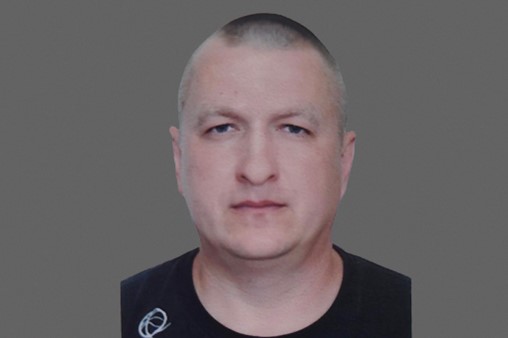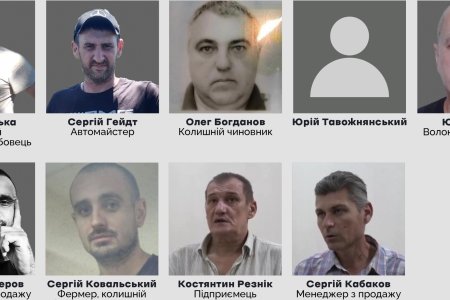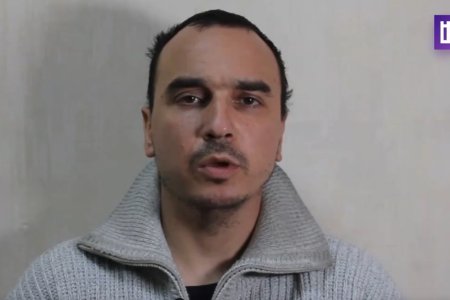
Lawyers representing nine Ukrainians abducted from Kherson in 2022 have lodged a formal complaint over the “systematic violence” that their clients have been subjected to by the Russians transporting them from prison to their ‘trial’ in Rostov. All nine men were tortured after their abduction and have since endured torture in one of Russia’s notorious SIZO, or remand prisons, with presiding ‘judge’ Kirill Nikolaevich Krivtsov even blocking attempts to get the men’s injuries recorded. It seems unlikely, therefore, that Krivtsov’s decision on 29 May 2025 to pass the lawyers’ complaint to Russia’s Investigative Committee is more than a mere formality.

That does not make such resistance from the Ukrainian political prisoners themselves, and their lawyers, any the less important, especially given the legitimate grounds they would have for fearing reprisals from Russia’s FSB and prison staff. Mediazona reports that eleven lawyers signed an application for their clients’ safety to be ensured. In a likely understatement, they wrote that the men had been “brought into court in a depressed state” and that Yuriy Kayov bore visible marks on his face from the violence to which he had been subjected. All of the men had been forced to get to the court in squatting position, something which Mediazona points out, is not only degrading, but can be difficult where a person is older or in poor health. In fact, since all of the men have been in captivity for three years, and are known to have endured horrific torture, it is unlikely that any of them are in good health.
Mediazona reports that such ill-treatment of prisoners being brought to court or taken back to the SIZO has become standard, with this not the first time that lawyers have applied for medical examinations of their clients and for measures of protection to be ordered. Such applications are, however, just as standardly ignored by the court.

OMON officers, accompanying the prisoners, also actively obstruct the lawyers, preventing them from speaking with their clients and agreeing documents with them before the hearing or during the break. The court does nothing to protect the rights of the prisoners, claiming that this is not within its jurisdiction, a claim that the defence emphatically reject.
As well as applying for measures to be taken to ensure the prisoners’ safety, their lawyers also asked for the retention of CCTV footage from the court and the area where the men are brought in from the convoy vehicles.
The lawyers’ application, which was supported by all of the defendants, was, typically, turned down by Krivtsov who claimed that the court did not have the authority to order a check of enforcement officers. Krivtsov, however, acknowledged that the lawyers were asserting behaviour that did, at very least, exceed the convoy officers’ authority and ordered that the complaint be passed to the Investigative Committee and the prosecutor. It will be sent, together with a copy of the minutes of the hearing on 15 May. These set down lawyer Anastasia Samorukova’s statement that her client, Yuriy Kayov, had been brought into court with blood on his face. Asked by the judge, Kayov himself said that he had lost consciousness and “hit his head” when the convoy officer forced him to walk upstairs in squatting position. He explained that, in reprisal for Kayov’s written complaint about the convoy’s behaviour on the previous occasion, all of the men had been forced to get from the basement to the court moving in squatting position. He had become weak and had told the convoy officer of this. “At that moment, I hit my head against something”. This time, at least, Krivtsov did order a break so that an ambulance could be called, and record Kayov’s injury.

Serhiy Heidt had not been brought to court at all on 15 May, with the staff at SIZO No. 1 claiming, in a message to the court, that Heidt had “refused to come out of his cell and was pretending to be feeling unwell.” Heidt had, however, been asked by video link about this and said that he had been feeling unwell since the previous evening, but that they had only given him some kind of medication at 11 a.m. The men’s lawyers had then pointed out that Heidt appeared to be avoiding the camera, possibly so that they would not see evidence that he had been beaten. Although he was swift to deny having sustained any such injuries, he would very likely have been in the video link room together with the officers responsible for them.
The nine Ukrainians are held in SIZO No. 1 in Rostov which has recently become one of the SIZOs of particularly ill repute for its torture and ill-treatment of Ukrainian political prisoners and POWs. It is possible that the change came about because the authorities wanted to deflect attention from the notorious SIZO in Taganrog where 27-year-old Ukrainian journalist Victoria Roshchyna died in September 2024, probably after being subjected to torture.
As reported, the situation at SIZO No. 1 in Rostov does appear to have dramatically worsened in the middle of January 2025, with Ukrainian prisoners beaten, forced to sing the Russian anthem and subjected to reprisals if their lawyers lodge complaints.

There was also a rather typical, and primitive, attempt to torture the nine men from Kherson into agreeing to renounce their independent lawyers. Krivtsov read out two documents during the hearing on 30 January 2025. These were dated 20 and 21 January and had reached the court by post from SIZO No. 1. Two of the men had, supposedly, rejected the services of their lawyers, using identical wording to justify such a ‘decision’.
In court, the two men rejected the documents and asked the court to ignore them, explaining that since the middle of January 2025, Ukrainians held in SIZO-1 in Rostov had been subjected to violence on a daily basis, with the men beaten during every ‘check’ [more details of the methods of violence and torture here].

The lawyers had asked the court to issue a separate ruling with respect to the head of the SIZO and also to adjourn the hearing as the men were simply not in a state to continue given the treatment they are enduring which one of the men said was like something out of the middle ages.
Prosecutor Sergei Aidinov, who has taken part in numerous ‘trials’ of Crimean Tatar and other Ukrainian political prisoners, as has, albeit on a lesser scale, ‘judge’ Kirill Nikolaevich Krivtsov. Aidinov claimed that the allegations in the lawyers’ report were unfounded and demanded that the court reject them. Krivtsov not only obliged him in this, but refused to issue a regarding the SIZO head, but also refused to call an ambulance so that medical staff could record the men’s bruises, etc.

Oleh Bohdanov (b. 1972); Serhiy Heidt (b. 1981); Serhiy Kabakov (b. 1974); Yuriy Kayov (b. 1983); Serhiy Kovalsky (b. 1990); Denys Lialka (b. 1988); Serhiy Ofitserov (b. 1976); Konstiantyn Reznik (b. 1964) and Yuriy Tavozhniansky (b. 1980) were seized by Russian soldiers at various times in July and August 2022. There is a very wide range of ages and occupations among the nine men, and it seems likely that some were targeted as former military servicemen.
They were held incommunicado first in the illegal torture chambers that Russia set up in occupied Kherson, before being taken, first to occupied Crimea and then to the Lefortovo SIZO in Moscow. All are charged with two counts of Article 361 § 1 (‘act of international terrorism’); Article 30 § 3 (an attempted crime) and Article 205.4 § 2 (participation in a terrorist society).

Russia introduced ‘acts of international terrorism’ to its criminal code back in 2016 but only began using the relevant article after its full-scale invasion of Ukraine. An ’act of international terrorism’, according to Article 361, refers to an explosion, act of arson or other actions, committed outside Russia and jeopardizing the life, health, freedom or inviolability of Russian citizens “for the purpose of violating the peaceful co-existence of states and peoples, or aimed against the interests” of Russia. An alleged plan to commit such an act will do, with Russia’s FSB having been fabricating criminal charges based on allegedly ‘thwarted plans’ against Ukrainians since 2014. Yuriy Kayov has given a detailed account of the torture used to extract his supposed ‘confession’, and there is no reason to believe that Russia’s treatment of the other men was any different.

The charges are quite absurd with the men accused of an unsuccessful ‘assassination attempt’ against Kyrylo Stremousov, a Ukrainian collaborator installed by the Russians as so-called ‘deputy head of the military-civic administration’ in occupied parts of Kherson oblast. Stremousov was killed three months later on 9 November 2022, two days before the liberation of Kherson. An alleged attack on a Ukrainian traitor is scarcely ‘an act of international terrorism’. Seemingly the latter charge is justified by the claim that such an unproven plan against Stremousov might have killed civilians. This was in Kherson, it should be stressed, with any civilians likely to also be Ukrainian. Any Russians, on the other hand, in occupied Kherson were either military or individuals brought in as active participants in Russia’s illegal occupation of the city [more details here].
Since the Memorial Support for Political Prisoners Project suggests that the men are divided between two different SIZOs, addresses will be given for letters when this is clarified.
Oleh Bohdanov (b. 30 November 1972) , former deputy head of the Kherson City Council’s Department of transport and road infrastructure, and communications
Abducted in the summer of 2022 (No photo is currently available)
Serhiy Heidt (b. 12 May 1981), car mechanic
Abducted 19 July 2022
Serhiy Kabakov (b. 18 January1974), worked as a sales manager in Kherson.
Abducted on 21 July 2022
Yuriy Kayov (b. 6 June 1983), Red Cross volunteer
Abducted on 3 August 2022
Serhiy Kovalsky (b. 18 July 1990), former Ukrainian military serviceman
Abducted on 3 August 2022
Denys Lialka (b. 8 August 1988)
Former Ukrainian military serviceman
Abducted on 14 July 2022
Serhiy Ofitserov (b. 12 May 1976)
Serhiy was born in Kherson, but lived as a child in Russia, where he also received Russian citizenship before he returned to Ukraine, aged 20.
Abducted on 3 August
Konstiantyn Reznik (b. 2 July 1964), Kherson businessman
Abducted on 21 July 2022
Yuriy Tavozhniansky (b. 20 January 1980)
Abducted in the summer of 2022



